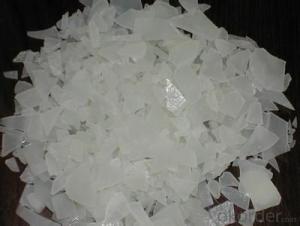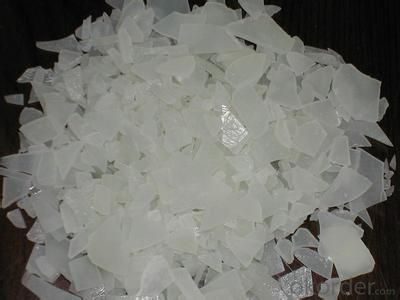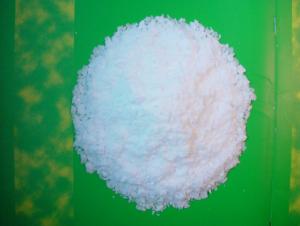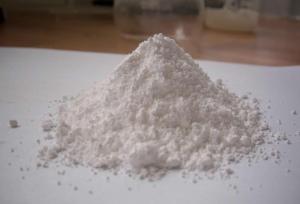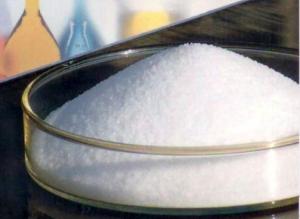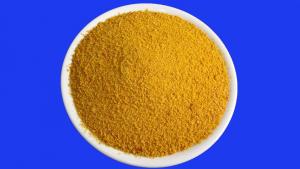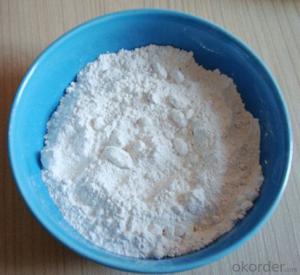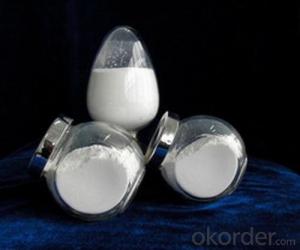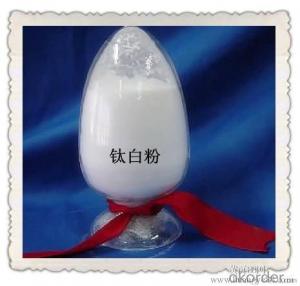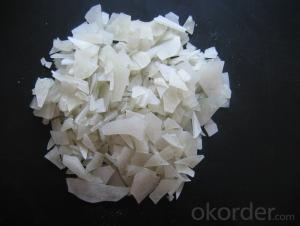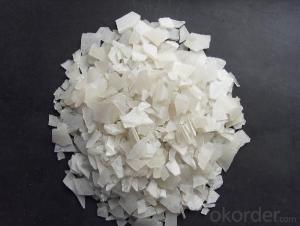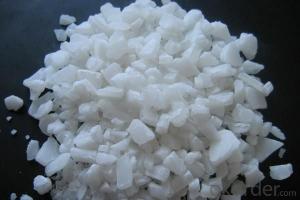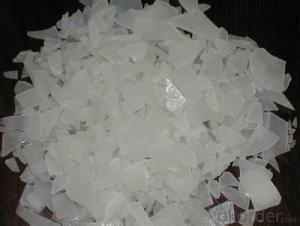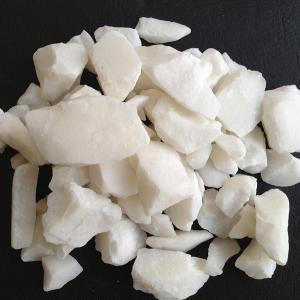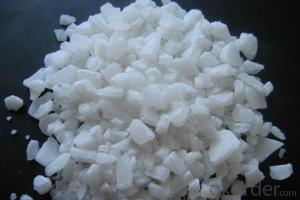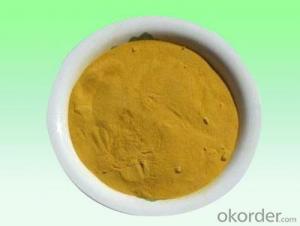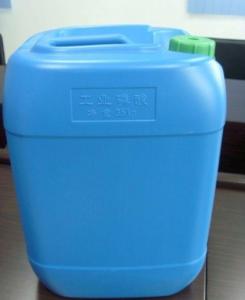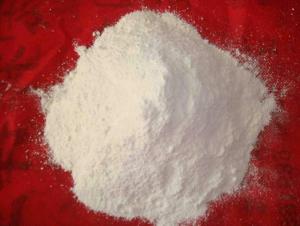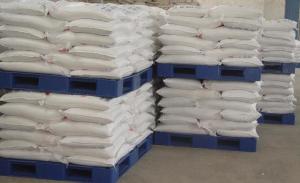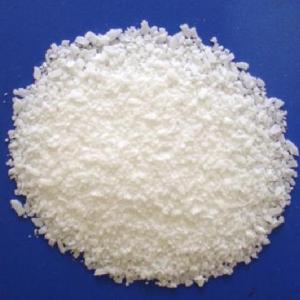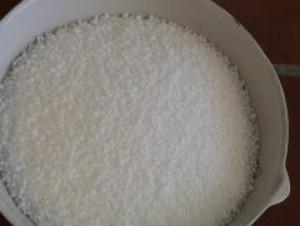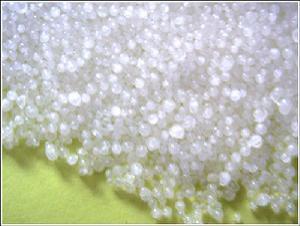low price ferric aluminium sulphate powder
- Loading Port:
- China Main Port
- Payment Terms:
- TT OR LC
- Min Order Qty:
- -
- Supply Capability:
- -
OKorder Service Pledge
OKorder Financial Service
You Might Also Like
Packaging & Delivery
| Packaging Detail: | PP/PE 50kg/bag;25kg/bag;Jumbo bag or according to customers' requirements. 20-25MT will be loaded in per 20'FCL container. |
| Delivery Detail: | Within 15 days after receiving the prepayment or L/C. |
Specifications
Aluminium Sulphate
Molecular Formula:Al2(SO4)3
Purity:Al2O3 15.8% 16% 17%
Shape:Flake,Granular,Powder
CAS NO.10043-01-3
1. Chemical and Physical Properties:
Product name: Aluminium Sulphate or Aluminum Sulfate
Shape: Flakes or Granular or Powder.
EINECS NO.:233-135-0
CAS No.: 10043-01-3
HS.Code: 28332200
Molecular Formula: Al2(SO4)3
Appearance:It is white or grey flake,particle or massive crystallization.
Apt to cake after moisture absorption when laid in air for a long time.A little green because of Fe2+ ,yellow when Fe2+ is oxided to Fe3+.Soluble in water easily,and water solution is acid.
2. Specification:
Standard: HG/T 2225-2001 and HG/T 2227-2004
Items | Specifications | |||
I Type:Low Ferrous/Low Iron | II Type:Non-Ferrous/Iron-free | |||
First Class | Qualified | First Class | Qualified | |
Al2O3 % ≥ | 15.8 | 15.6 | 17 | 16 |
Ferrous(Fe )% ≤ | 0.5 | 0.7 | 0.005 | 0.01 |
Water Insolube % ≤ | 0.1 | 0.15 | 0.1 | 0.15 |
PH (1% aqueous solution) ≥ | 3.0 | 3.0 | 3.0 | 3.0 |
Arsenic(As) %≤ | 0.0005 | 0.0005 | ||
Heavy metal (Pb) %≤ | 0.002 | 0.002 | ||
3.Applications:
Water effluent treatment system
It's used for purification of drinking water and wastewater treatment by settling of impurities by
means of precipitation and flocculation.
Paper Industry
It helps in sizing of paper at neutral and alkaline pH, thus improving paper quality (reducing spots
and holes and improving sheet formation and strength) and sizing efficiency.
Textile Industry
It is used for color fixing in Naphthol based dyes for cotton fabric.
Other Uses
Leather tanning, lubricating compositions, fire retardants; decolorizing agent in petroleum, deodorizer; food additive; firming agent; dyeing mordant; foaming agent in firefighting foams; fireproofing cloth; catalyst; pH control; waterproofing concrete; aluminum compounds, zeolites etc.
4. Package:
Packaging Detail: PP/PE 50kg/bag;25kg/bag;Jumbo bag or according to customers' requirements.
20-25MT will be loaded in per 20'FCL container.
5. Attention and Storage:
The product is liable to absorb moisture and clot due to long-term exposure, so shady, cool and ventilated environment is needed.
- Q: What is white alkali?
- Sodium carbonate [497-19-8] (Na2CO3), molecular weight 105.99. Chemical purity of more than 99.5% (mass fraction), also known as soda ash, but the classification belongs to the salt, does not belong to the base. International trade, also known as soda or alkaline ash. It is an important organic chemical raw materials, mainly for the production of flat glass, glass products and ceramic glaze. But also widely used in life washing, acid and food processing.
- Q: Inorganic salt of the inorganic salt function
- Although inorganic salts in the cell content is relatively small, but there are many important role. Ca2 + is the animal bone and teeth (containing CaCO3) composition, and blood coagulation and muscle contraction has a regulatory role, if the content is too low, the animal will appear muscle twitch. K + is a variety of enzyme activator, for the plant starch and protein synthesis and animal nerve impulse conduction and muscle contraction also plays an important role. Fe is a component of hemoglobin and cytochrome, and iron-containing enzymes are indispensable when chlorophyll is formed in plants. Another example is Na + for animal heart beat, nerve excitement is indispensable. The various inorganic salts dissolved in the cells have a certain total concentration, such as human body fluid concentration of 0.9%, frogs of 0.65%, which for maintaining cell osmotic pressure, so that cells maintain a certain shape has an important role, too high or Too low will lead to cell due to water or dehydration to change the cell morphology. There are also a number of buffering systems in the body, which are a group which has a neutralizing effect on the added acid or base so that the pH does not change significantly and therefore plays an important role in maintaining the acid-base balance of the cells.
- Q: Our home often burn porridge which put a little alkali inside, so delicious, more entrance, eat often harmful to the health of it?
- Long-term consumption will lead to body fluid imbalance, leading to the emergence of the disease
- Q: Eye acid is how the matter
- Chinese medicine to see the eyes of the problem, always from the liver, heart, spleen, lung, kidney five internal organs, or with the internal organs of the six organs of view, from the internal organs and twelve meridians cold and hot reality point of view. Eyes we generally think that with the liver and kidney by the two meridians most closely, of course, also have a relationship with the heart, but the most important liver and kidney. Most of the eyes of the old flower state of the people, mostly kidney or kidney water is relatively virtual; young people are mostly aphrodisiac more prosperous.
- Q: Alkali soda water
- Soda water is an aqueous solution of sodium bicarbonate, containing weakly alkaline, medical topical disinfectant, drinking and neutralizing the body's acid-base balance, changing the acidic constitution. Most of the soda water sold on the market is a synthetic carbonated beverage that is compressed into purified water and added sweeteners and fragrances. Soda water is a carbonated beverage, is pressed into purified drinking water into carbon dioxide, and add sweeteners and spices. He is an aqueous solution of sodium bicarbonate, containing weakly alkaline, medical topical sterilization, oral administration can be integrated within the body's acid-base balance, change the acidic body. Sodium bicarbonate is what we say baking soda molecular formula NaHCO3 is usually said that the surface screwdriver, but this is not directly joined the surface screwdriver, the market selling soda water is mostly in the purified drinking water into the carbon dioxide, and add Sweeteners and fragrances of synthetic synthetic carbonated beverages. Baking soda: NA2CO3 soda: NAHCO3, weak base. Medical topical disinfection can be sterilization, oral administration can cure too much acid. Soda water is actually carbonated water Well, Coke, whiskey what is inside. Pure soda water also has, usually the equipment, supermarkets have to sell. Can be used for cocktails. Can go to the pharmacy to buy small soda tablets with warm water to the system, but the concentration is not good to master.
- Q: What is the disease of inorganic salt crystals?
- It is recommended to drink boiled water.No need to take medication.
- Q: Do you eat too much alkali to harm your body?
- Excessive intake of alkali hazards: The disadvantage of edible alkali is the food in the vitamin B1, B2 and vitamin C has a strong destructive effect, and will affect the body of certain minerals absorption and utilization, so do not overuse.
- Q: The addition of inorganic salt viscosity of micelles increased first and then increased again and then reduced, there is no possibility ah? Yes, then what is the reason for the increase ah?
- possible. The inorganic salt is dissolved in water to form positive and negative ions, and the ions of the micelles are extruded to make the solubility smaller and form an increase in the viscosity. With the increase in the amount of inorganic salt, it does not have the ability to dissolve in water, there is no micelles and the molecular state exists in the water, the liquid becomes thin ...
- Q: Spring to the mulberry began to mature, this sweet and sour feeling really good. What are the benefits of eating mulberry on our body?
- This must eat fresh, when the child yard mulberry tree, a mother-in-law to pick the tree to sell, pick up the ground to eat, the results of poisoning died, absolutely true thing!
- Q: Does the apple contain inorganic salts and vitamins?
- Yes, the fruit is rich in these two nutrients, especially apples
Send your message to us
low price ferric aluminium sulphate powder
- Loading Port:
- China Main Port
- Payment Terms:
- TT OR LC
- Min Order Qty:
- -
- Supply Capability:
- -
OKorder Service Pledge
OKorder Financial Service
Similar products
Hot products
Hot Searches
Related keywords
